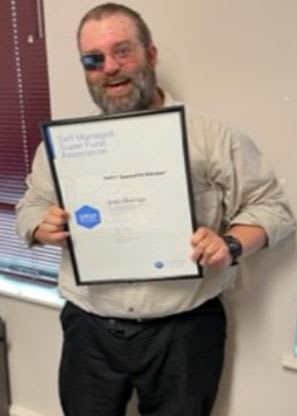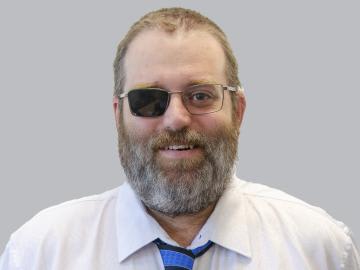Living and working with Multiple Sclerosis
Around 4.3 million Australians are living with a disability. A large proportion of people with disabilities are also gainfully employed, bringing uncommon tenacity to their jobs. International Day of People with Disability (IDPwD) falls on 3 December each year, a United Nations observed day aimed at increasing awareness, understanding, and acceptance of people living with a disability.
James Rurenga is one of Albany's (in Western Australia) resident Self-Managed Superannuation Fund (SMSF) experts, having joined RSM as a Graduate back in 2011. He is as good at many things as he is at dispensing advice on SMSFs - prior to joining RSM, James was a 'Gossipmonger', where he recorded radio talk shows, summarised these stories, and sold the recordings to businesses and politicians. With a strong background in computer technology, James also dabbles in home automation, Internet of Things (IoT), robotics, and is a gaming expert. For some screen-free time, he's a 4WD overlander and avid camper.
For the last 20 years, James has been living with Multiple Sclerosis (MS), a chronic disease that affects the central nervous system.
In this interview, James shares candidly about his journey of living and working with MS.
Tell us a bit about yourself and your background.
I was hired by RSM over 12 years ago, or rather RSM Bird Cameron as it was called back then, fresh out of TAFE. At that stage, no one, including me, knew if this was going to work. Everyone was taking a gamble, but days turned into months and into years. From my perspective, the gamble paid off. With RSM I have always been in superannuation, I love the strictness and rigidity of this field, there are no grey areas. It is as if this job was tailor-made and invented just for me. Today I am an accredited Superannuation Specialist with the SMSF Association. Tomorrow world domination?
To relax, I enjoy going bush and getting the digital detox. Because of issues with my balance, I'll never walk to some spots, but I will drive. Some of the tracks I drive down would make Graham Cahill and Sean Whale cringe. So far I have been lucky, my mechanic has fixed everything I've broken. But honestly the crew I go with is magnificent as they generally do the heavy work when it comes to recoveries, and I haven’t been left stuck in the bush, yet. Next year will be the start of solo adventures with one of Len Beadell’s highways.
I detest being in the city. People have a habit of assuming I'm drunk, because of my balance and gait. So I try to avoid large crowds whenever I can.
What is MS? When and what symptoms or signs led you down the path of an MS diagnosis?
It all started 20 years ago. My eyes went cross-eyed, and I lost my balance soon after. It only took six months to go from an active lifestyle to being in a wheelchair. The doctors said I would never walk again. Steroids, a lumber punch, and finally a brain biopsy confirmed it was MS. The next year, or so, was spent getting my independence back, and getting out of that chair. I could finally move back out of home, my parents have never been that happy.
MS is basically a problem where the nerves in your brain get inflamed and this disrupts the communication between the brain and the body. It is why it can affect some people mentally. I am lucky this way. An easier way for people to understand is the nerves in your brain are like a power cord. Metal wire surrounded by a plastic sheath. Hold a flame to the cord and the plastic will bubble and melt until the cord is effectively broken.
At least I can say, with a straight face, the problem is all in my head.
How has living with MS impacted the way you work?
In my previous life, I was a computer technician. I fixed ATMs, circuit boards, you name it I could pull it apart and figure out how to fix it. When I lost my depth perception and fine motor skills I had to give it all up. Soldering was now impossible. After being on a pension for a few years I retrained as an accountant, and have been doing this ever since. Personally, I don’t think it affects the way I work at RSM, but it probably causes some headaches for the Christmas party planners. I better not go paintballing.
Your colleagues sometimes say you are fully integrated into the team that they forget most of the time that you have MS. For a person living with a disability, what's more helpful - to treat them as you would any other colleague so they don't feel different OR seek ways to create awareness of the person's physical/mental limitations.
Would you raise issues about a person's nationality? Whether someone has a disability/chronic illness, it should not be the primary focus of anyone. My colleagues tend to forget because I don’t let MS get in my way. Although I'm sure they get a kick out of watching me climb the stairs, after a decade it’s not as laugh-out-loud as it once was.
What advice would you give about working with a team member who has a disability?
Don’t think about it. Can they do the job?
The theme for 2022’s International Day for People with a Disability is transformative solutions for inclusive development. How has innovative technologies and other changes in the way we work helped your journey at RSM?
Being an accountant I am lucky in that the majority of my day-to-day tasks are not majorly affected by technological changes. However, the changes in teleconferencing over the last few COVID years have meant that I have not needed to walk across the hotel grounds for tax updates or training sessions. It's all mostly online now. I hope that stays for the future.
Although if they want to put a lift in the office, I won't argue.
There is the old adage that what doesn't break you makes you stronger. Do you think that's true with the experience you've had living with MS?
Absolutely. After a few years of feeling sorry for myself with the woe is me attitude, I realised I was not in a coffin so I should either get over it and move on with life or invest in a coffin proper. I think I made the right choice.



